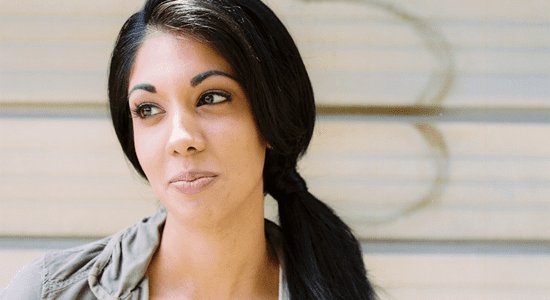Emerging Author of the Month: Sarena Parmar

Diaspora Dialogues
July 3, 2012

Tell us about yourself.
I grew up in Kelowna, BC. I had taken a creative writing class in high school, but never thought much of it. I went on to pursue my career as an actor. I studied collective creation with One Yellow Rabbit in Calgary and commedia dell’arte in Italy. But my main learning happened at the National Theatre School, where I studied acting for three years. In my second year, we had to create a ten-minute solo-show. And I immediately thought, oh shit! I have nothing to write about—nothing I wanted to say. But eventually, I created a piece called Inheritance. And after that I realized maybe I do have something to say.
My trajectory as a playwright has been a shy, slow growing emergence. Always apologizing for being an actor first and a playwright second. But slowly people showed interest in my work, which allowed me to build skills and confidence. Inheritance was accepted into the Diaspora Dialogues mentorship program, and grew into a one-act, three woman play. I created a one-woman show, Through the Lens, which was invited to be a part of the Summerworks Youth Reading Series. But it has only been in the last two years that I have begun to identify myself as an actor AND playwright. I was part of the Cahoot’s Playwriting Unit last year, which was a huge turning point for me mentally. Currently, I am working on a re-imagining of Anton Chekhov’s The Cherry Orchard, based on my personal experience of growing up as an orchardist. Set in the Okanagan during the Trudeau Era, it follows a Punjabi-Sikh family fighting to save their orchard from foreclosure. The play examines the minority experience in rural Canada and the search for a better life, at a time when multiculturalism was born and anything was possible.
Tell us about the piece you’ve decided to share.
This is the first few pages of a piece called The Park. The play began as a short writing exercise, but I quickly realized, there was something bigger I wanted to explore with these characters.
The play examines what happens when two unlikely strangers meet. Both characters want to connect so badly with another human being, they are blind to the consequences. The Park looks at the dangerous lengths people will go to in order to survive.
When and why did you realize you had a passion for writing?
When I realized there were stories I wanted to tell, needed to tell. And that no one else could tell them; because no one has had my experiences, history, or emotional makeup. I believe we all have that ability and uniqueness in us.
What pieces of writing/authors have had the greatest impact on you?
I don’t know if any one writer has had THE major impact on me. Because I work in theatre and television as an actor, I am constantly surrounded by writers, scripts and stories. I think I took for granted what I’ve learned about playwriting or who I have been influenced by. But it is the everyday events that have the biggest impact on me. I see a moment happen in real life, and it rings true to something so much bigger. I ask myself: why does this move me? And how can I create this feeling in my plays?
What kind of writer do you aspire to be?
A writer that can show the ugliness and beauty of the human condition. We, as human beings, are so complex. It is endlessly fascinating to me.
How and when do you find time to write?
It is definitely hard to find time to write. I’m not the type of person who can schedule only an hour to work and actually get something on the page. It takes me a while to get settled and filter out distractions. So I’ve started creating self-imposed writing retreats. I’ll book off five days and do nothing but write, sleep and eat. It allows me to clear my mind and immerse myself in the play.
